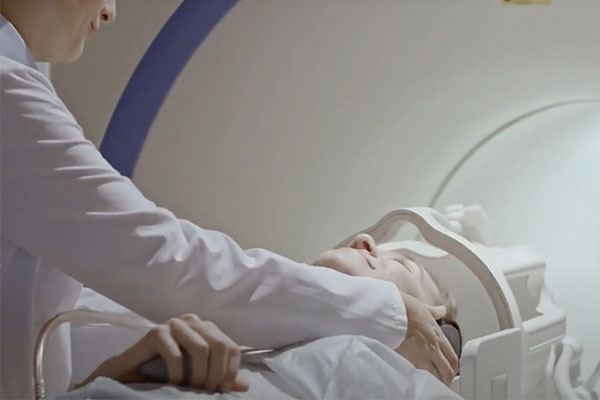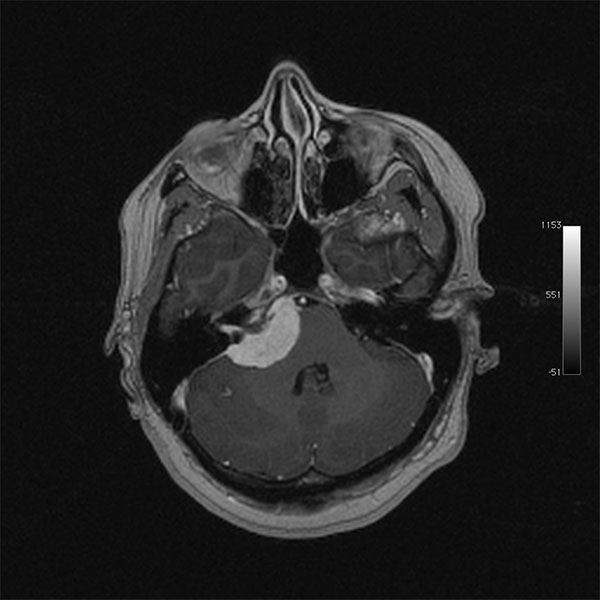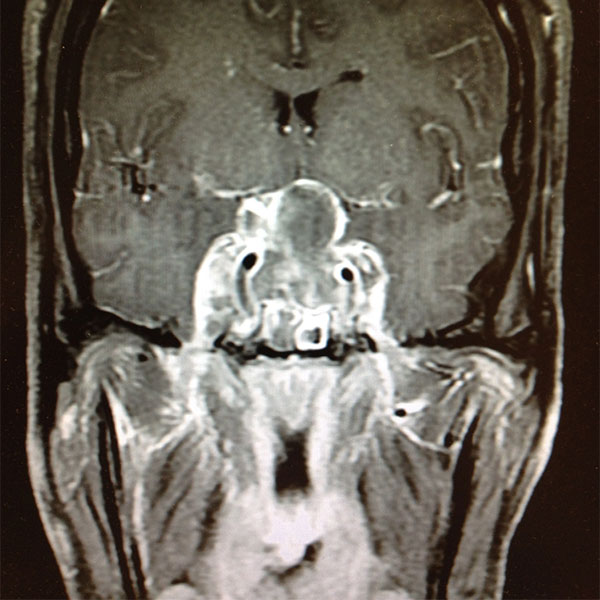As a distinguished board-certified neurosurgeon, Dr. Gregory Lekovic possesses unparalleled expertise in diagnosing and treating various brain conditions. He is dedicated to providing specialized care for patients facing various challenges and remains at the forefront of diagnosing, treating, and managing complex brain conditions. These are some of the common brain conditions treated by Dr. Lekovic.
Acoustic Neuroma
Acoustic neuroma, also known as vestibular schwannoma, is a non-cancerous tumor that typically develops on the vestibulocochlear nerve, located in the internal auditory canal responsible for hearing and balance. These slow-growing tumors can cause various symptoms, including hearing loss, tinnitus (ringing in the ears), and imbalance. As they enlarge, they may press against adjacent structures, leading to facial numbness or weakness. Early detection and treatment, such as surgery or radiation therapy, are essential for managing acoustic neuromas effectively
Possible Symptoms Of Acoustic Neuroma:
- Hearing loss
- Tinnitus (ringing in the ears)
- Imbalance or unsteadiness
- Facial numbness or weakness
- Difficulty with coordination
- Problems with swallowing
- Headaches
- Ear fullness or pressure
- Changes in taste sensation

Meningioma
Meningioma is a type of brain tumor that develops in the meninges, the protective membranes surrounding the brain and spinal cord. These tumors are usually non-cancerous (benign) but can cause symptoms as they grow and pressure surrounding structures. Meningiomas can vary in size, location, and growth rate, and their effects on neurological functions can vary depending on their specific location within the brain.
Possible Symptoms Of Meningioma:
- Headaches
- Seizures
- Weakness or numbness in limbs
- Vision changes
- Hearing loss
- Memory problems
- Personality changes
- Difficulty with balance and coordination
- Fatigue
- Nausea and vomiting
- Changes in speech or language abilities
Pituitary Adenoma
Pituitary adenoma is a type of tumor that develops in the pituitary gland, a small gland located at the base of the brain. These tumors arise from the gland’s cells and can be benign or, less commonly, cancerous (malignant). Depending on their size and hormone-secreting capabilities, pituitary adenomas can lead to hormone imbalances and various neurological symptoms. Prompt diagnosis and monitoring are essential for managing these tumors.
Possible Symptoms Of Pituitary Adenoma:
- Headaches
- Vision problems
- Hormone imbalances (e.g., changes in menstrual cycle, growth abnormalities)
- Fatigue
- Nausea and vomiting
- Loss of smell (anosmia)
- Weakness or numbness in limbs
- Sexual dysfunction
- Mood changes
- Memory problems
- Increased thirst and urination
Cerebral Aneurysm
A cerebral aneurysm is a weakened and bulging area in the wall of a blood vessel in the brain. Over time, the aneurysm may enlarge and become susceptible to rupture, leading to potential life-threatening bleeding into the surrounding brain tissue (hemorrhage). This condition poses a significant risk as it can cause a life-threatening hemorrhagic stroke. Early detection and monitoring are crucial to prevent complications and ensure appropriate management.

Possible Symptoms Of Cerebral Aneurysm:
- Sudden severe headache
- Nausea and vomiting
- Stiff neck
- Sensitivity to light (photophobia)
- Blurred or double vision
- Loss of consciousness or fainting
- Seizures
- Difficulty speaking or understanding speech
- Weakness or numbness on one side of the body
- Dilated pupils
- Confusion or altered mental state
Brain Cancer
Brain cancer refers to the abnormal growth of cells within the brain, leading to the formation of malignant tumors. Unlike some other brain conditions, these tumors are cancerous and can pose significant health risks. Brain cancer may arise from the brain’s cells or result from the spread of cancer from other parts of the body (metastatic brain cancer). Symptoms can vary widely, including headaches, seizures, cognitive changes, and motor impairments. Early diagnosis and a personalized treatment plan are crucial for managing brain cancer effectively.
Possible Symptoms Of Brain Cancer:
- Changes in personality or behavior
- Persistent headaches
- Seizures
- Nausea and vomiting
- Cognitive impairments
- Weakness or numbness in limbs
- Vision disturbances
- Difficulty speaking or understanding speech
- Balance and coordination problems
- Fatigue
Hemifacial Spasms
Hemifacial spasms are involuntary muscle contractions or twitches that affect one side (hemifacial) of the face. These spasms typically start around the eye and may gradually spread to involve other facial muscles on the same side of the face. The contractions can be mild and barely noticeable or severe and disruptive, causing significant discomfort and affecting a person’s appearance.
The primary cause of hemifacial spasms is usually the compression or irritation of the facial nerve (cranial nerve VII) by a blood vessel, often an artery, as it exits the brainstem. This pressure on the facial nerve disrupts its normal function, leading to spasms. Dr. Gregory Lekovic is highly experienced in treating a hemifacial spasm in Los Angeles.

Other Brain Conditions:
Please note that this list is not exhaustive, and Dr. Lekovic treats a wide range of brain conditions. If you or a loved one are experiencing symptoms related to any of these conditions or have questions about other brain-related issues, don’t hesitate to contact Dr. Lekovic’s office for further information.
- Ependymoma
- Petroclival, cerebellopontine angle, and tentorial meningioma
- Schwannoma of the facial and trigeminal nerves
- Epidermoid tumor
- Tegmen defect/ CSF otorrhea
- Skull base encephalocele
- Cavernous sinus tumor
- Chordoma
- Chondrosarcoma
- Esthesioneuroblastoma
- Metastatic tumor
- Lower Cranial Nerve Peripheral Nerve Sheath Tumors
- Arnold-Chiari Malformation
- Foramen Magnum Meningioma
- Jugular Foramen Meningioma
- Metastatic and primary malignancies of the CVJ
Glossopharyngeal Neuralgia (Throat Pain)
Glossopharyngeal neuralgia is a rare neurological disorder characterized by recurring episodes of intense, stabbing pain in the throat, tonsils, or base of the tongue. The glossopharyngeal nerve, responsible for sensation in these areas, becomes irritated or compressed, leading to sudden and excruciating pain. The pain episodes can be triggered by simple activities such as swallowing, speaking, or coughing. Glossopharyngeal neuralgia can significantly impact a person’s ability to eat, drink, and talk comfortably.
Possible Symptoms Of Glossopharyngeal Neuralgia:
- Intense, stabbing pain in the throat
- Pain in the tonsils or base of the tongue
- Sudden onset of pain episodes
- Pain triggered by swallowing, speaking, or coughing
- Electric shock-like sensations in the throat
- Pain that may radiate to the ear
- Throat discomfort and sensitivity
- Short duration of pain episodes (seconds to minutes)
- Pain-free intervals between episodes (remissions)
- Impaired ability to eat, drink, or talk comfortably
Trigeminal Neuralgia (Facial Pain)
Trigeminal neuralgia is characterized by sudden, severe, and stabbing facial pain along the trigeminal nerve, which is responsible for sensation in the face. The pain can be triggered by mundane activities such as chewing, talking, or even a gentle touch. The episodes of excruciating pain are often brief but intense, leading to significant discomfort. Trigeminal neuralgia can be debilitating, impacting daily activities and quality of life.
Possible Symptoms Of Trigeminal Neuralgia:
- Sudden, severe, and stabbing facial pain
- Pain along the trigeminal nerve distribution (jaw, cheeks, forehead)
- Pain triggered by everyday activities such as chewing or speaking
- Brief but intense episodes of pain
- Electric shock-like sensations in the face
- Pain on one side of the face
- Pain that may be triggered by light touch or a gentle breeze
- Pain-free intervals between episodes (remissions)
- Facial twitching or spasms (in some cases)
- Discomfort and sensitivity in the affected areas
Contact Us Today
Dr. Lekovic and his compassionate team are dedicated to providing exceptional neurosurgical care tailored to your needs. If you or a loved one require expert evaluation and treatment for brain or spinal conditions, including a hemifacial spasm in Los Angeles, we encourage you to contact us. With Dr. Lekovic’s extensive experience, cutting-edge techniques, and patient-centered approach, you can trust your health is in the best hands. Take the first step towards improved neurological well-being by contacting us today.





